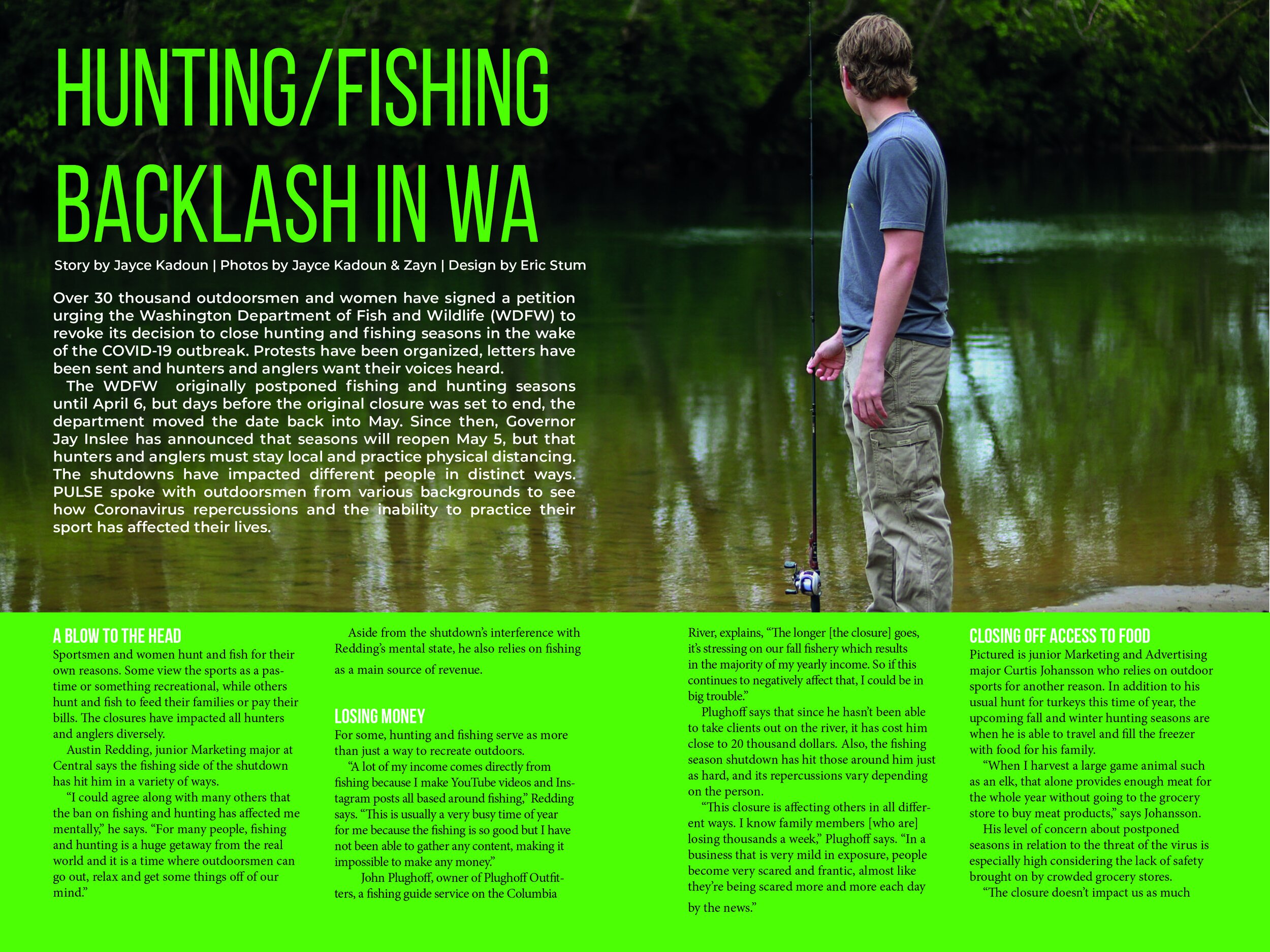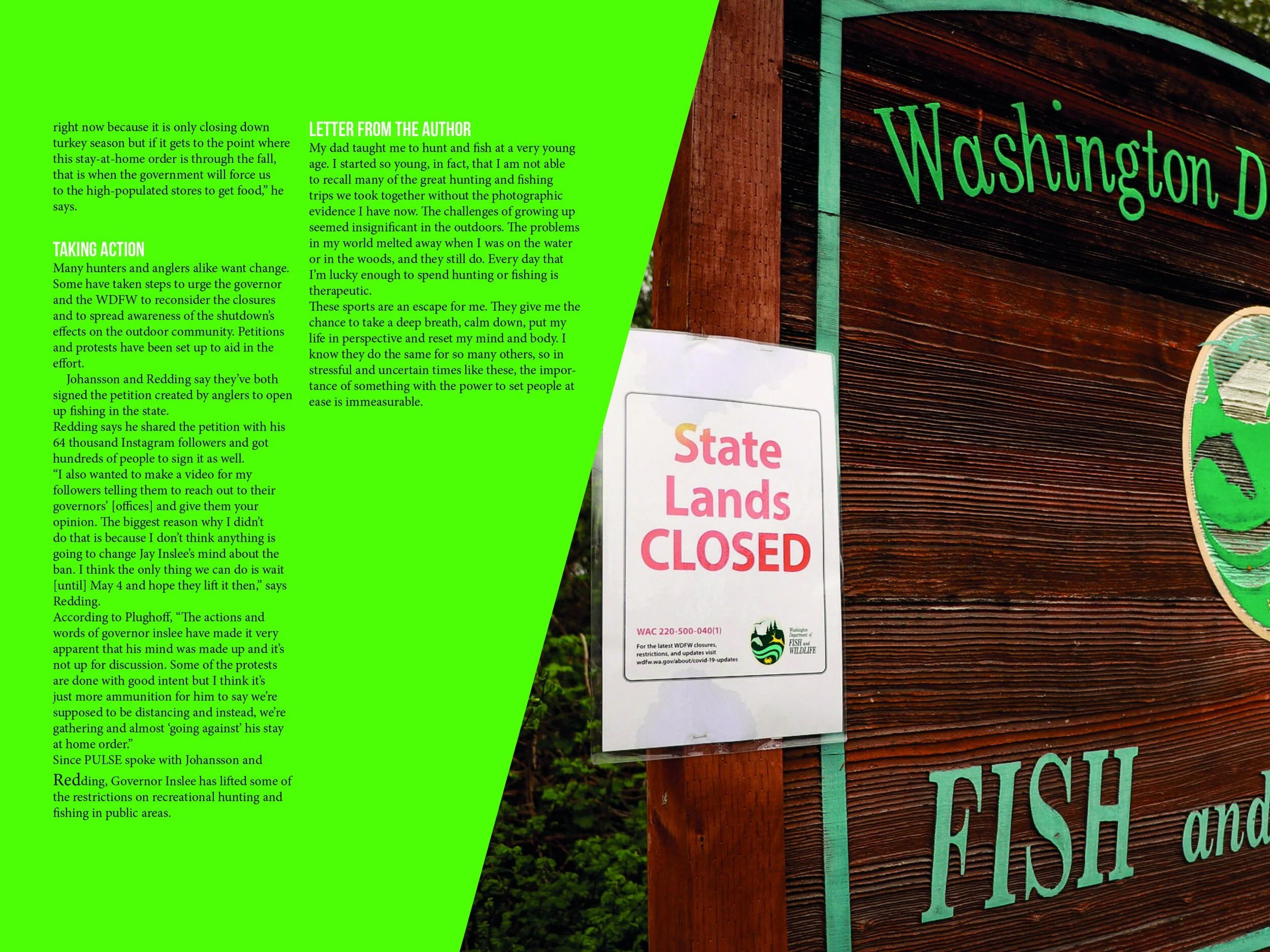Hunting and Fishing Closures Hit Outdoorsmen Hard
Story and Photos by Jayce Kadoun | Design by Krista Kok
Over 30 thousand outdoorsmen and women have signed a petition urging the Washington Department of Fish and Wildlife (WDFW) to revoke its decision to close hunting and fishing seasons in the wake of the COVID-19 outbreak. Protests have been organized, letters have been sent and hunters and anglers want their voices heard.
The WDFW originally postponed fishing and hunting seasons until April 6, but days before the original closure was set to end, the department moved the date back into May. Since then, Governor Jay Inslee has announced that seasons will reopen May 5, but that hunters and anglers must stay local and practice physical distancing.
The shutdowns have impacted different people in distinct ways. PULSE spoke with outdoorsmen from various backgrounds to see how Coronavirus repercussions and the inability to practice their sport has affected their lives.
A Blow to the Head
Sportsmen and women hunt and fish for their own reasons. Some view the sports as a pastime or something recreational, while others hunt and fish to feed their families or pay their bills. The closures have impacted all hunters and anglers diversely.
Austin Redding, junior Marketing major at Central says the fishing side of the shutdown has hit him in a variety of ways.
“I could agree along with many others that the ban on fishing and hunting has affected me mentally,” he says. “For many people, fishing and hunting is a huge getaway from the real world and it is a time where outdoorsmen can go out, relax and get some things off of our mind.”
Aside from the shutdown’s interference with Redding’s mental state, he also relies on fishing as a main source of revenue.
Losing Money
For some, hunting and fishing serve as more than just a way to recreate outdoors.
“A lot of my income comes directly from fishing because I make YouTube videos and Instagram posts all based around fishing,” Redding says. “This is usually a very busy time of year for me because the fishing is so good but I have not been able to gather any content, making it impossible to make any money.”
John Plughoff, owner of Plughoff Outfitters, a fishing guide service on the Columbia River, explains, “The longer [the closure] goes, it’s stressing on our fall fishery which results in the majority of my yearly income. So if this continues to negatively affect that, I could be in big trouble.”
Plughoff says that since he hasn’t been able to take clients out on the river, it has cost him close to 20 thousand dollars. Also, the fishing season shutdown has hit those around him just as hard, and its repercussions vary depending on the person.
“This closure is affecting others in all different ways. I know family members [who are] losing thousands a week,” Plughoff says. “In a business that is very mild in exposure, people become very scared and frantic, almost like they’re being scared more and more each day by the news.”
Closing Off Access to Food
Pictured is junior Marketing and Advertising major Curtis Johansson who relies on outdoor sports for another reason. In addition to his usual hunt for turkeys this time of year, the upcoming fall and winter hunting seasons are when he is able to travel and fill the freezer with food for his family.
“When I harvest a large game animal such as an elk, that alone provides enough meat for the whole year without going to the grocery store to buy meat products,” says Johansson.
His level of concern about postponed seasons in relation to the threat of the virus is especially high considering the lack of safety brought on by crowded grocery stores.
“The closure doesn’t impact us as much right now because it is only closing down turkey season but if it gets to the point where this stay-at-home order is through the fall, that is when the government will force us to the high-populated stores to get food,” he says.
Taking Action
Many hunters and anglers alike want change. Some have taken steps to urge the governor and the WDFW to reconsider the closures and to spread awareness of the shutdown’s effects on the outdoor community. Petitions and protests have been set up to aid in the effort.
Johansson and Redding say they’ve both signed the petition created by anglers to open up fishing in the state.
Redding says he shared the petition with his 64 thousand Instagram followers and got hundreds of people to sign it as well.
“I also wanted to make a video for my followers telling them to reach out to their governors’ [offices] and give them your opinion. The biggest reason why I didn’t do that is because I don’t think anything is going to change Jay Inslee’s mind about the ban. I think the only thing we can do is wait [until] May 4 and hope they lift it then,” says Redding.
According to Plughoff, “The actions and words of governor inslee have made it very apparent that his mind was made up and it’s not up for discussion. Some of the protests are done with good intent but I think it’s just more ammunition for him to say we’re supposed to be distancing and instead, we’re gathering and almost ‘going against’ his stay at home order.”
Since PULSE spoke with Johansson and Redding, Governor Inslee has lifted some of the restrictions on recreational hunting and fishing in public areas.
Letter From the Author:
My dad taught me to hunt and fish at a very young age. I started so young, in fact, that I am not able to recall many of the great hunting and fishing trips we took together without the photographic evidence I have now. The challenges of growing up seemed insignificant in the outdoors. The problems in my world melted away when I was on the water or in the woods, and they still do. Every day that I’m lucky enough to spend hunting or fishing is therapeutic.
These sports are an escape for me. They give me the chance to take a deep breath, calm down, put my life in perspective and reset my mind and body. I know they do the same for so many others, so in stressful and uncertain times like these, the importance of something with the power to set people at ease is immeasurable.











